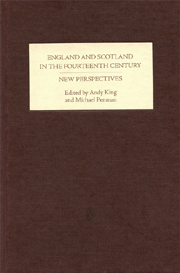Book contents
- Frontmatter
- Contents
- List of Contributors
- Acknowledgements
- Abbreviations
- 1 Introduction: Anglo-Scottish Relations in the Fourteenth Century – An Overview of Recent Research
- 2 The English Army and the Scottish Campaign of 1310–1311
- 3 ‘Shock and Awe’: The Use of Terror as a Psychological Weapon during the Bruce–Balliol Civil War, 1332–1338
- 4 The Scots and Guns
- 5 Edward Balliol: A Re-evaluation of his Early Career, c. 1282–1332
- 6 Scoti Anglicati: Scots in Plantagenet Allegiance during the Fourteenth Century
- 7 Best of Enemies: Were the Fourteenth-Century Anglo-Scottish Marches a ‘Frontier Society’?
- 8 Dividing the Spoils: War, Schism and Religious Patronage on the Anglo-Scottish Border, c.1332–c.1400
- 9 The Pope, the Scots, and their ‘Self-Styled’ King: John XXII's Anglo-Scottish Policy, 1316–1334
- 10 Sovereignty, Diplomacy and Petitioning: Scotland and the English Parliament in the First Half of the Fourteenth Century
- 11 National and Political Identity in Anglo-Scottish Relations, c.1286–1377: A Governmental Perspective
- 12 Anglici caudati: abuse of the English in Fourteenth-Century Scottish Chronicles, Literature and Records
- 13 Anglo-Scottish Relations in the Later Fourteenth Century: Alienation or Acculturation?
- Index
13 - Anglo-Scottish Relations in the Later Fourteenth Century: Alienation or Acculturation?
Published online by Cambridge University Press: 12 September 2012
- Frontmatter
- Contents
- List of Contributors
- Acknowledgements
- Abbreviations
- 1 Introduction: Anglo-Scottish Relations in the Fourteenth Century – An Overview of Recent Research
- 2 The English Army and the Scottish Campaign of 1310–1311
- 3 ‘Shock and Awe’: The Use of Terror as a Psychological Weapon during the Bruce–Balliol Civil War, 1332–1338
- 4 The Scots and Guns
- 5 Edward Balliol: A Re-evaluation of his Early Career, c. 1282–1332
- 6 Scoti Anglicati: Scots in Plantagenet Allegiance during the Fourteenth Century
- 7 Best of Enemies: Were the Fourteenth-Century Anglo-Scottish Marches a ‘Frontier Society’?
- 8 Dividing the Spoils: War, Schism and Religious Patronage on the Anglo-Scottish Border, c.1332–c.1400
- 9 The Pope, the Scots, and their ‘Self-Styled’ King: John XXII's Anglo-Scottish Policy, 1316–1334
- 10 Sovereignty, Diplomacy and Petitioning: Scotland and the English Parliament in the First Half of the Fourteenth Century
- 11 National and Political Identity in Anglo-Scottish Relations, c.1286–1377: A Governmental Perspective
- 12 Anglici caudati: abuse of the English in Fourteenth-Century Scottish Chronicles, Literature and Records
- 13 Anglo-Scottish Relations in the Later Fourteenth Century: Alienation or Acculturation?
- Index
Summary
The visit of David II to England in 1363–64 marks the high point in cordial relations and chivalrous acculturation between the Scottish and English courts and higher nobilities in the later middle ages. It left a decided afterglow, in the volume of visits to England, or passage through it, or by its coasts, of courtiers, diplomats, scholars, traders and crusaders. After the renewal of the Anglo-French conflict in 1369, Scottish soldiers conspicuously served the English Crown down to the making of the 1375 truces. However, the manifold breaches of truce between Scotland and England in the later 1370s and early 1380s, and the major campaigns between 1384 and 1389, rekindled cross-Border enmities, and renewed widely in the two realms a sense of mutual alienation, reflected in the stridently nationally orientated anecdotes and denunciations characteristic of chroniclers. Did this strenuous and destructive warfare finally set hostility between Scot and English in stone? Or were there further episodes of acculturation which demonstrated and strengthened a hardy, perennial mutual ability to resume harmonious relations, and use them to manage conflict?
The rapprochements of the 1360s were certainly undermined in the next decade in a variety of ways. The accession of Robert II weakened the links between the two courts. He had not participated in their mergings, and the disfavour he showed to David's affinity and allies embraced some who notably had done so.
- Type
- Chapter
- Information
- England and Scotland in the Fourteenth CenturyNew Perspectives, pp. 236 - 254Publisher: Boydell & BrewerPrint publication year: 2007



